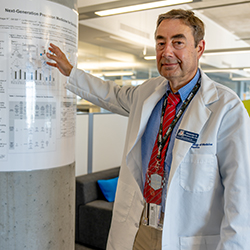
Breakthrough Study Leads to Better Assessment and Treatments for Chronic Pain

Chronic pain remains a massive health concern, particularly for mental health patients. Pain disorders are common and debilitating; an estimated 20% of adults in the United States experience chronic pain while 8% report high-impact chronic pain.
To address this issue, a new study conducted by Alexander Niculescu, MD, PhD — a professor of Psychiatry and director of the Center for Precise, Personalized and Preventive Psychiatry (C4p) at the University of Arizona College of Medicine – Phoenix — and other researchers developed a novel blood test to enable better diagnosis and treatments for this issue.
Published recently in the Nature Publishing Group journal Molecular Psychiatry, the research conducted two separate studies, each utilizing differing methodologies. One used a gene chip microarray methodology, while the other used next-generation genomic sequencing.
“It’s important to understand the biology because, in the future, new medications could be developed to target that new biological understanding,” Dr. Niculescu said.
The primary goal was to discover and validate biomarkers for chronic pain that are transdiagnostic. Through the two studies, the researchers were able to identify new, as well as previously known biomarkers that were predictive of high pain states as well as future exacerbations of pain.

In its conclusion, Dr. Niculescu and his team found 56 blood gene expression biomarkers linked to pain. Two of the top findings were CD55 and ANXA1. CD55 isa gene that suppresses cell damage; and it had lower activity in people suffering from chronic pain. ANXA1, which drives inflammatory responses, is more active with people living with chronic pain.
Dr. Niculescu said one of the purposes of the research was also to understand how the biology overlaps with other disorders. For two decades, his group has pioneered the study of blood biomarkers for psychiatric disorders. In the current study, they found strong evidence of overlap between pain biomarkers and those involved in hallucinations, stress, memory disorders, and suicidality.
“Empirically and clinically, we know people who are more depressed feel pain more and people who have PTSD might have exacerbations of their pain, but here’s molecular evidence,” Dr. Niculescu said. “The overlap that we found at a biomarker level illustrates the fact that in some forms of chronic pain, there is a central mechanism that needs to be targeted directly; otherwise, the pain does not resolve, and it is deemed 'treatment-refractory.'”
As a psychiatrist and a clinician, Dr. Niculescu treats patients for anxiety, depression, post-traumatic stress disorder and other ailments. Many of his patients suffer from chronic pain, so he has been aware of the possible relationship between mental health issues and chronic pain for some time.
“You cannot manage something if you cannot measure it well, so sometimes people get over-treated and sometimes people get under-treated,” Dr. Niculescu said.
This relationship between mental health and chronic pain in his patients fueled Dr. Niculescu to pursue this study. In such cases, a combination of mental health issues and chronic pain can lead to suicidal ideation or opioid abuse.
“If you put people on the right treatments, you prevent them from going down a route of spiraling into a cycle of despair and doing something irreversible,” Dr. Niculescu said.
The top therapeutic matches were the medications lithium and ketamine and the nutraceuticals omega-3 fatty acids and magnesium. Other new drugs that can be repurposed for pain were also identified.
The work conducted is a major breakthrough toward better understanding, diagnosing and treating pain. Because of these discoveries, doctors can look at patients reports based on blood biomarkers to assess the severity of the pain and identify matching medications and nutraceuticals.
Regarding the academic side, Dr. Niculescu said the insights that are known about pain biology can open new areas of research in terms of central pain mechanisms — such as looking at circuits in the brain.
“On the practical side, we are working hard to make these tests widely available, so that they can become part of routine medical care,” Dr. Niculescu said. “As a clinician, you want to help people directly by offering them a personalized solution for what ails them.”
About the College
Founded in 2007, the University of Arizona College of Medicine – Phoenix inspires and trains exemplary physicians, scientists and leaders to advance its core missions in education, research, clinical care and service to communities across Arizona. The college’s strength lies in our collaborations and partnerships with clinical affiliates, community organizations and industry sponsors. With our primary affiliate, Banner Health, we are recognized as the premier academic medical center in Phoenix. As an anchor institution of the Phoenix Bioscience Core, the college is home to signature research programs in neurosciences, cardiopulmonary diseases, immunology, informatics and metabolism. These focus areas uniquely position us to drive biomedical research and bolster economic development in the region.
As an urban institution with strong roots in rural and tribal health, the college has graduated more than 1,000 physicians and matriculates 130 students each year. Greater than 60% of matriculating students are from Arizona and many continue training at our GME sponsored residency programs, ultimately pursuing local academic and community-based opportunities. While our traditional four-year program continues to thrive, we will launch our recently approved accelerated three-year medical student curriculum with exclusive focus on primary care. This program is designed to further enhance workforce retention needs across Arizona.
The college has embarked on our strategic plan for 2025 to 2030. Learn more.